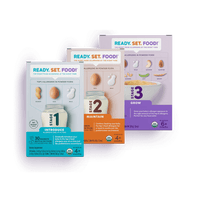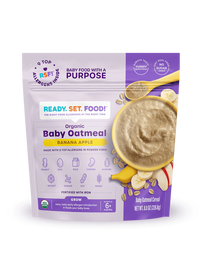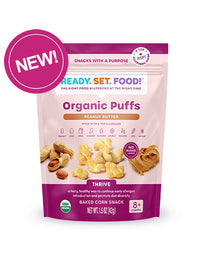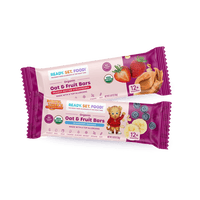Babies with eczema are at an increased risk for developing food allergies. Learn more about new medical recommendations for introducing babies with eczema to allergens.
- Up to 67% of babies with severe eczema will develop a food allergy
- Medical guidelines now recommend that babies with eczema be fed allergenic foods like peanut starting at 4-6 months
- Because eczema usually develops earlier than food allergies, there is a critical window of time for families to act
What is Eczema and How Common is It?
Eczema (or dermatitis) is a general term for a group of inflammatory skin conditions. Atopic dermatitis, the most common type of eczema, causes red, dry, and itchy skin. In infants, this form of eczema usually affects the face, scalp, and skin creases, but can also involve other areas of the body.
Eczema affects up to 20% of children, and most cases begin in children before the age of five.
How Does Eczema Affect A Child’s Risk for Food Allergies?
Atopic dermatitis is considered an immunologic disease, just like food allergies. “Babies with eczema are at a higher risk than the general population for developing food allergies. In fact, up to 67% of infants with severe eczema and 25% of infants with mild eczema will develop a food allergy," explains Jonathan Spergel M.D., Board Certified Allergist and Member of the National Eczema Association Scientific Advisory Committee. Additionally, most babies with eczema will develop skin symptoms before developing food allergies in the order that is commonly known as the "atopic march".
What Are the New Food Allergy Guidelines for Babies with Eczema?
In 2019, the American Academy of Pediatrics (AAP) started recommending early introduction of peanut for babies starting at 4-6 months of age, especially those with eczema. These new recommendations come as a result of recent landmark clinical trials, particularly the LEAP trial.
Medical societies around the world are now issuing new recommendations for infants with eczema. In 2020, British Society for Allergy and Clinical Immunology issued a recommendation that babies with eczema be introduced to allergenic foods such as egg and peanut as early as 4 months of age.
My Child Has Eczema. Should I Introduce Allergens?
Research shows that babies with eczema are at a higher risk of developing food allergies. Fortunately, early and sustained exposure to allergenic foods is recommended for babies with eczema. In fact, new guidelines from the NIH are specifically focused on infants with eczema.

Pros And Cons Of Sippy Cups
Thinking about giving your little one a sippy cup? Today, we’ll co...

What Toddlers Eat In A Day: 12-18 Months Old
Looking for ideas of what to feed your 12-18 month old little one? ...

New Study Shows That Infant Anaphylaxis Usually Resolves With One Epinephrine Dose
A recent study has shown that, when infants experience severe aller...

Pregnancy Nutrition: What To Eat In The First Trimester
What to eat in the first trimester that will nourish your body, pro...

Formula Feeding Amounts: How Much Formula Should You Feed Baby Per Day?
How much formula should baby drink per day? It depends on their age...

What Baby Eats In A Day: 6-12 Months Old
Looking for ideas of what to feed your 6-12 month old little one? H...
All health-related content on this website is for informational purposes only and does not create a doctor-patient relationship. Always seek the advice of your own pediatrician in connection with any questions regarding your baby’s health.
These statements have not been evaluated by the Food and Drug Administration. Products are not intended to diagnose, treat, cure or prevent any disease. If your infant has severe eczema, check with your infant’s healthcare provider before feeding foods containing ground peanuts.










